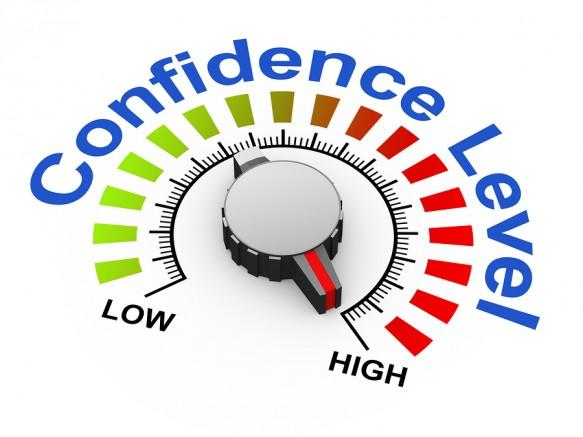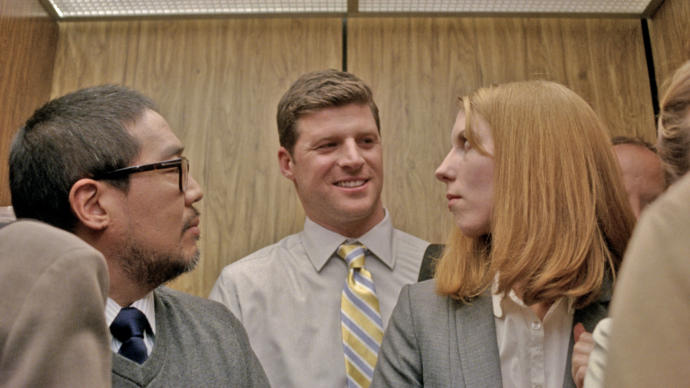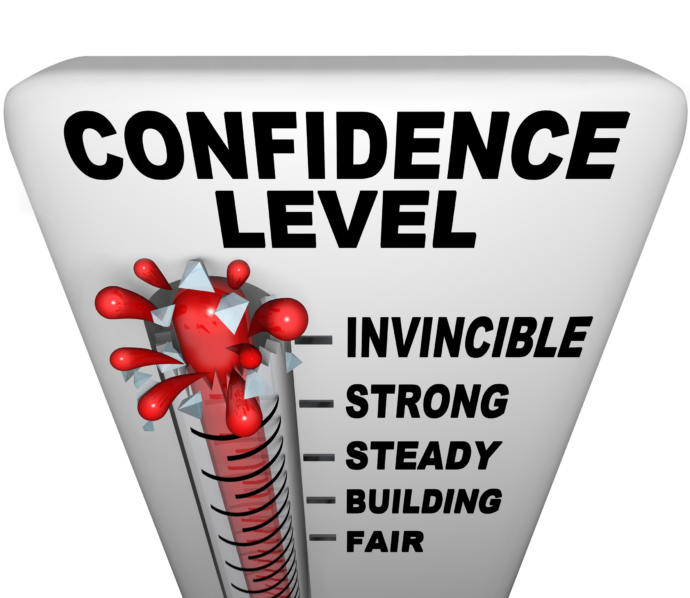This article is mainly intended towards those who lack confidence in the social realm, though it describes how to gain confidence in all areas. Let's begin by looking at a dictionary definition of confidence:
Confidence: belief in oneself and one's powers or abilities; self-confidence; self-reliance; assurance.
Many tend to tie this to self-esteem and sense of self-worth. There are even thesauruses which suggest "self-esteem" as a synonym.
I think this is incredibly prone to misunderstanding. I often see those who ask about how to gain confidence speaking a lot about their lack of self-esteem, as though loving themselves will automatically lead to confidence.

Alternative Definition
I'd like to propose a new definition:
Confidence: an absence of fear and doubt; fearlessness.
This definition is completely divorced from self-esteem and is not intended to be the most accurate description of confidence, though it may very well be. Whatever the case, I think this definition is the most useful for people lacking confidence who are perplexed by how others have so much of it.
Such is typically the case when I attempt to overload the dictionary. I realize this can be an annoying and confusing habit. I try to do it sparingly and I don't want to redefine the language so much as offer a different perspective on it that might help people gain some abilities that they lacked or better understand other people.
Self-Hatred
Consider a person who has the opposite of high self-esteem: a person who lacks it so much that it has turned into a form of self-loathing. They despise themselves.
In spite of this, they've developed a perspective that they have nothing left to lose. They lost the most valuable thing in their life and now they don't care much about anything. Such people can still have the most supreme confidence in spite of the self-loathing.
This was the case one time when I was brokenhearted. I became like Lucius Vorenus above and became the Son of Hades. I despised myself and I didn't care about anyone or anything. I wasn't quite suicidal but I didn't even care much if I died; I didn't love anything, and especially didn't love myself.
In spite of this, I had never been more confident in my life. I even attracted girls more easily during that stage than ever before in spite of not even bothering to look my best. I got drunk a lot and even got into brawls in bars and clubs. I didn't even mind getting into a fight anymore and somewhat welcomed it; it at least seemed interesting. It sounds like I should have been repelling girls left and right with that type of behavior, but somehow I was attracting many who were approaching me even though I wasn't very interested at all.

In retrospect I was supremely confident during that time in spite of the self-loathing. Someone can be confident even if their self-esteem is at an all-time low. What I had going for me during that all-time low in my life was a complete absence of fear.
Losing what you consider the most precious thing in your life can make you unafraid of anything. It can lead to a mindset of, "What more is there to lose? What's the worst that could happen now?" If we think we're at rock bottom, the answer to those questions is "nothing".
This isn't to suggest that people hit rock bottom as a way to gain confidence. Nevertheless, it highlights that confidence can be completely independent of one's perception of self-worth.
Fearlessness
How do we achieve a state of fearlessness? The easiest way comes from confronting those fears again and again. The fears will typically subside at that point.
People who lack confidence in the social realm often have all kinds of irrational fears. They might fear rejection or embarrassment or being misjudged more than being injured or even killed in extreme cases. Some may even commit suicide as a result of being misjudged and rejected by others. Their priorities are irrational and completely messed up.
Irrational Fears
Not all fears are irrational, but they reach an irrational point when the worst thing that could happen is typically not so bad or so astronomically improbable.
Take a fear of heights. That's a fairly rational fear, and it's not necessarily good if every human being loses that fear and develops supreme confidence to the point where they're tightrope walking from dangerous heights with no concern about their safety whatsoever.

Yet if the fear of heights manifests itself in perfectly safe settings where there is virtually no risk of falling, then it has reached a very irrational extreme and could prevent the person from being able to function in the real world. That type of irrational fear is worth overcoming. It's worth gaining some confidence.
If we want to overcome our most irrational fears, it's worth having some courage and confronting them repeatedly. If we do and simultaneously realize that nothing particularly horrible is happening, those fears will subside.
Social Fears
For people who lack confidence in the social realm, the same thing applies. To overcome those fears and doubts, we must confront them. However, it's also helpful to develop a change in mindset. A lot of social doubts manifest themselves in terms of questions:
Q: What if someone I like rejects me?
A: Then they don't like you like that way. It's not the end of the world. The sun won't stop coming up every day. You're not going to starve to death. It doesn't mean that you're unattractive; even a super star isn't attractive to everyone. It just means you're not their type.
It's not a big deal; shrug it off and move on.
Q: What if I say something dumb and people misjudge me?
A: People are going to misjudge you either way, and generally even more so if you remain absolutely quiet. No one can read your mind, and the only thing that comes close is if you skillfully communicate what's going on in your mind. You also won't develop the social skills to do this effectively if you don't practice.
You're never going to be perfectly understood by anyone, not even your closest lover or even your own family. Some people are going to have a very inaccurate image of who you are. The people who can potentially develop a more accurate image will still need you to open up to them. It's not a big deal if you're misunderstood or even hated by some people in this world.
It's not wise to be a quiet person if your desire is to be well-understood by others; you deprive yourself of any chance of doing that by remaining quiet. It's only wise to be a quiet person if you don't care at all and have no great desire to bond intimately with others.
Q: I'm developing feelings for a friend. What if I ruin my friendship by pursuing this person?
A: Are you going to be content in the following years, potentially seeing this friend gain his/her share of lovers, while having known that you never even tried to pursue them romantically? Are your feelings just going to magically subside staying close to this person while having never put in any effort to seek something more?
The answer to these questions is typically "no". The friendship was already jeopardized the moment you developed feelings for this friend. It's better to try and fail than to live in regrets, considering what could have happened if you just tried something.
Furthermore, it won't necessarily jeopardize your friendship to try something. It depends on how you approach this situation. If you take giant leaps and bold moves, confessing your undying love for this friend, then yeah, you're probably seriously risking the friendship. Bold moves carry tremendous risk.
If you take a series of small moves like casually asking the person to hang out, flirting, bonding, and seducing them in private afterwards in a series of baby-steps, then you aren't necessarily jeopardizing the friendship. If at any point, they reject your small advances, you can potentially diffuse the awkwardness of the situation and remain friends provided you can quickly shrug off a rejection.
By taking baby-steps over insanely bold moves, a rejection can still help your situation without destroying the friendship. It might help you realize you're not your friend's type and eliminate the crush while still giving you the ability to remain great friends. You're then free to target your affections towards someone else. This is even easier if you do this sooner than later and not after crushing on someone for months or years.
Q: What if people start to hate me?
A: Then some people will hate you. What's the big deal?
It's generally far better to express yourself and be uninhibited by all sorts of irrational fears. This will typically lead to some unfortunate incidents where some people can come to strongly dislike you.
Generally this is inevitable if you gain lots of popularity, which will typically happen on its own if you're very confident. You'll gain some loyal fans while you'll also gain some haters. That's just how it goes if you become a very well-known person who people really notice.
At the same time, it's better to be loved by some and hated by others as a result of expressing who you are. This is generally a much happier lifestyle than it is to be unappreciated and misunderstood by everyone as a result of failing to do this. Being an invisible person as a result of such doubts is often a miserable and lonely lifestyle.
Q: What if I embarrass myself and everyone laughs at me?
A: Embarrassment is something more often taken than given. If you feel lots of shame in such a scenario, then you'll be embarrassed for ages over it. If you don't feel shame, then you won't.
If you lack any form of shame whatsoever, you can even laugh it off and make a joke. With the right sense of humor, you can even turn things around so people are laughing with you instead of at you. You have to be able to shrug this off, however, and not be easily hurt by it in order to develop this style of humor.
Even if you don't have the humor but completely lack shame, you can even turn things around in a way where you make other people uncomfortable instead of you.
Take a scenario where you fart in an elevator and it's kind of loud and smelly. You can be totally embarrassed about this and try to pretend someone else farted. A really embarrassed person might even hold their nose and really try to avoid taking any accountability here.

Yet you can just avoid being embarrassed and feel no shame. You can announce:
Hey everyone, I just farted. Sorry about that; it was an accident. My farts usually aren't this smelly but I ate a lot of garlic for dinner. I think I have one more fart coming, but it's going to occur a few more seconds from now.
Now everyone else is uncomfortable except you. If you have no shame, you can end up embarrassing everyone else instead of taking any embarrassment for yourself. I'm not necessarily suggesting everyone does this, but this can be a useful example for people who get embarrassed all the time. Embarrassment is optional.
Balancing Confidence
Confidence isn't always a great quality. There are some scenarios where it's healthy to have some rational level of fear and doubt.
If we're in charge of security, for example, it's not necessarily good to be so lacking in doubts and fears that we never even double-check the systems. Supreme confidence can even become irrational in this sense, depending on the context.
At the same time, it's not good to be paranoid about security. There's a balance to be had there.
Gaining Confidence
I hope this article can help some people to begin gaining confidence in areas where they could benefit greatly from doing so. Again we don't necessarily have to love ourselves and think we're so amazing to have confidence.
All we need to do to gain a healthy dose is to eliminate those irrational doubts and fears. This can be accomplished by repeatedly confronting those fears and also adjusting our frame of thought.
What's the worst that could practically happen?
This is a useful question, especially when we consider the "practically" part and avoid obsessing on astronomically improbable scenarios.

 Holidays
Holidays  Girl's Behavior
Girl's Behavior  Guy's Behavior
Guy's Behavior  Flirting
Flirting  Dating
Dating  Relationships
Relationships  Fashion & Beauty
Fashion & Beauty  Health & Fitness
Health & Fitness  Marriage & Weddings
Marriage & Weddings  Shopping & Gifts
Shopping & Gifts  Technology & Internet
Technology & Internet  Break Up & Divorce
Break Up & Divorce  Education & Career
Education & Career  Entertainment & Arts
Entertainment & Arts  Family & Friends
Family & Friends  Food & Beverage
Food & Beverage  Hobbies & Leisure
Hobbies & Leisure  Other
Other  Religion & Spirituality
Religion & Spirituality  Society & Politics
Society & Politics  Sports
Sports  Travel
Travel  Trending & News
Trending & News
Most Helpful Opinions